Will the 'Iranian threat' push Arabs closer to Israel?
Emirati ambassador to the US, Yousef al-Otaiba and Bahrain’s legal advisor Sheika Haya Rashed al-Khalifa attended the event in New York on Monday, which was largely dominated by pro-Israeli US diplomats, including organisation founder, Mark Wallace and former CIA chief James Woolsey.
The day-long conference was organised by UANI, which describes itself as a spearhead for the “global education campaign focused on the risks of doing business with Iran."
The public event was launched by the UAE’s ambassador, al-Otaiba who discussed the Gulf State’s view of the nuclear deal almost a year after it had been reached.
Arab academics including Lebanese Tony Badran and Saudi Arabian Mohammed Khalid Al-Yahya were among the speakers presenting the fourth session entitled Iran's Destabilising Role in the Middle East.
 |
But claims of alleged non-bias within the group lack credibility when deciphering the organisation’s founder, Mark Wallace – an adamant pro-Israeli who held a substantial position among the administration and circle of former conservative US president, George W Bush |  |
UANI professes to be a “non-profit, non-partisan” organisation which confirms its main focus is “ending the economic and financial support of the Iranian regime by corporations at a time when the international community is attempting to compel Iran to abandon its illegal nuclear weapons programme."
But claims of alleged non-bias within the group lack credibility when deciphering the organisation’s founder, Mark Wallace – an adamant pro-Israeli who held a substantial position among the administration and circle of former conservative US president, George W Bush.
Despite calling for a complete end to Iran’s nuclear ambitions in the Middle East, the speakers failed to mention or address the only other Israel’s arsenal capabilities – a clear show of bias on behalf of the self-proclaimed non-biased organisation.
In addition to this, Wallace stated that “the most important reason” to stand against Iran’s nuclear ambitions is to “stop support for the terrorist Hamas organisation” – Iran’s “biggest sin,” he adds.
No mention was however made regarding Iran’s other interventions in the region, including Iraq, Syria, Yemen and Lebanon, but Wallace notes a nuclear Iran will prompt nations such as Egypt, Saudi Arabia and Turkey to counter the threat by acquiring nuclear weapons of their own.
 |
No mention was however made regarding Iran’s other interventions in the region, including Iraq, Syria, Yemen and Lebanon, but Wallace notes a nuclear Iran will prompt nations such as Egypt, Saudi Arabia and Turkey to counter the threat by acquiring nuclear weapons of their own |  |
It appears that the organisation revolves around securing Israel’s position as the sole holder of nuclear weapons in the Middle East, despite its disarmament rhetoric.
A similar perception can be extracted from former intelligence chief, James Woolsey who does not attempt to conceal his obvious anti-Arab views while calling Israel the “only democracy in the region”.
Ironically, the former chief dismisses Israel’s violations of international law but instead focuses on Iran’s regional-rival Saudi Arabia (possibly not realising that Saudi Arabia is working avidly against Iran's nuclear industry).
Woolsey called for a crackdown on the kingdom in every way possible, urging for an abrupt halt of its Wahhabi ideology.
Anti-Iranian sentiment has been on the rise across the region since Iran began negotiating with Western states over its nuclear programme and as accusations of Iranian interference in regional conflicts have become widespread.
 |
Anti-Iranian sentiment has been on the rise across the region since Iran began negotiating with Western states over its nuclear programme |  |
Reports suggest Saudi Arabia and Israel (which is not officially recognised by Riyadh) have recently put aside their enmity and held secret talks to confront their common enemy in Tehran.
Officially, Arab governments have no qualms about recognising Israel.
Following the Madrid Conference and the Oslo Accords between a segment of the Palestinians and Israel, Arab governments decided to renounce military means to liberate Palestine and opted for negotiations with Israel as a "strategic choice".
Egypt and Jordan are currently the only Arab countries to have full diplomatic relations with Israel.
Cosying up to Israel is often motivated by cynical calculations, in addition to alleged economic benefits and keenness to attract Western aid, despite recent event suggesting the region is more concerned with countering its undesired neighbour, Iran.



